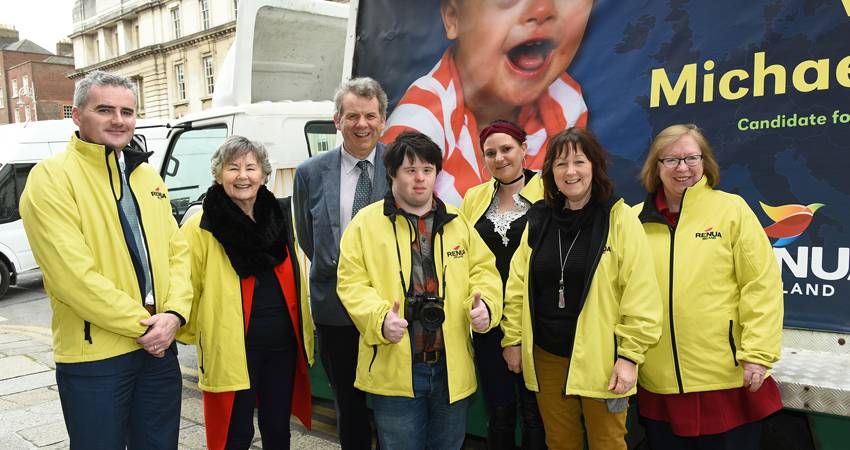
Renua candidate launches powerful pro-life billboard on Down Syndrome testing
Michael O'Dowd, the Renua candidate for the European elections has launched a new billboard as part of his campaign which seeks to ensure that babies with Down Syndrome are not eliminated by aggressive pre-natal screening programs.
The billboard points out that Big Pharma is making €592 million from aggressively promoting screening, but they are under no obligation to take any responsibility to ensure parents are provided with up-to-date, factually correct information about the conditions involved. Mr O'Dowd, a long-time disability rights campaigner, said this needed to change.
"We have an industry here, the prenatal screening industry, that's making a small fortune from identifying children who have Down Syndrome thus ensuring they are terminated," he said. "That's not good enough, we need to make sure they realise they have responsibilities."
"On World Down Syndrome Awareness Day, I am asking the government to take steps to ensure that screening isn't used to eliminate people with Down Syndrome, like my son Conor.
They can do this by ensuring that the providers of prenatal tests are obliged by law to provide supportive, accurate and positive information to parents where baby is diagnosed with Downs baby - so that parents are told about the possibilities and the improvements in outcomes and the joy instead of the negative, outdated responses they are hearing now which is leading to 90%+ of babies with the condition being aborted."
Michael has been a highly active campaigner for the rights of people with intellectual disabilities for many years and a board member of Ablevision Ireland, a media production and training company for people with intellectual disabilities.
He pointed to Chloe's Law in Pennsylvania as an example of best practise - and where government had stepped up to ensure that
Chloe's law requires "health care practitioners to disseminate information relating to Down syndrome and imposes duties on the Department of Health."
It states that "A health care practitioner that administers or causes to be administered a test for Down syndrome to an expectant or new parent shall, upon receiving a test result that is positive for Down syndrome, provide the expectant or new parent with educational information made available by the department, including educational and support programmes."
Mr O'Dowd said that screening companies could also make financial contributions to programmes which sought to make opportunites available to people with Down Syudrome who are making great strides in education and careers.
Featured
- Campaign to stop EU funding out of state abortions - tell your EU commissioner to vote NO
- Judge recuses himself from case of woman praying in censorship zones for “apparent bias”
- I’m a Celebrity star criticises “sad” UK law that aborts babies with Down Syndrome up to birth
- British actress speaks out on “serious risk” assisted suicide bill has for those with eating disorders
- Caplan’s “Tragic Hysteria of Abortion” discusses the flaws with mainstream Turnaway Study interpretations
- Backlash as Scotland report proposes legalising sex-selective abortion up to birth
- Canada hits new record as 1 in 20 deaths a result of Euthanasia
- Ben Scallan defends pro-life on TV show Dinner with the Enemy
- Influencers share the loss of their beloved unborn baby
- Dublin woman with cancer says unborn child was sent to save her
- Mother and baby doing well after surgery for mother’s cancer during pregnancy
- Josiah: Abortion Survivor
- Loving the Unborn
- Rally for Life 2025
- Don't assist Suicide 2024
You can make a difference.
DONATE TODAY